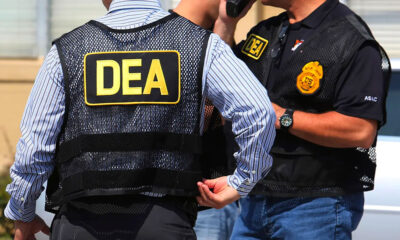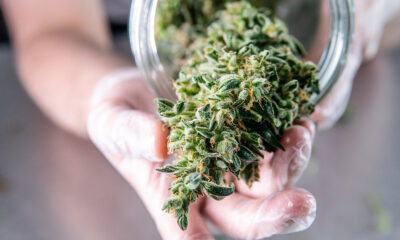
Legal
Suing for Safe Access: Cannabis Prohibition Is Going on Trial
Several plaintiffs, including 12-year-old cannabis patient Alexis Bortell, have filed a lawsuit against Attorney General Jeff Sessions and the DEA challenging the legality of marijuana’s Schedule I status.
Any lawsuit against the United States government is, by definition, a long shot; the imbalance of power is simply too large — it’s like trying to break the house at the roulette wheel. The odds of success are nearly as long as the inevitable appeal process, but despite the odds, a lawsuit against Attorney General Jeff Sessions and the DEA challenging the Constitutionality of cannabis prohibition is moving forward.
The suit is broad in scope and confronts the government from several angles, alleging that the Schedule I status and prohibition of cannabis under the Controlled Substances Act violates the Fifth Amendment’s Due Process clause and numerous protections guaranteed by the First Amendment, undermines the fundamental right to travel and runs afoul of the Commerce Clause.
Michael Hiller, an attorney connected to the suit, said the central issue of the case is the Schedule I status of cannabis and its essential lack of legal legitimacy.
Hiller told Rolling Stone:
“We know for a fact that the U.S. government knows that cannabis cannot be legally classified as a Schedule I drug, the requirements for which are a high potential for abuse, no medical efficacy whatsoever, and a substance so dangerous that it can’t be tested even under strict medical supervision. And we know cannabis doesn’t meet those requirements.”
Additionally, the lawsuit points to the racially and politically motivated origins of prohibition and the CSA; not only the racist views and tactics of notorious prohibition propagandist Henry Anslinger — who was instrumental in ushering in the first wave of “marihuana” prohibition — but also the targeting of black people, Jews, young people and other groups deemed “enemies” of the Nixon administration, which spearheaded the CSA.
John Ehrlichman, who served as counsel and Assistant to the President for Domestic Affairs under the Nixon administration, told Dan Baum of Harper’s Magazine that Nixon’s enhanced criminalization of drugs wasn’t really about drugs.
Ehrlichman said in Harper’s:
“The Nixon campaign in 1968, and the Nixon White House after that, had two enemies: the antiwar left and black people… We knew we couldn’t make it illegal to be either against the war or black, but by getting the public to associate the hippies with marijuana and blacks with heroin, and then criminalizing both heavily, we could disrupt those communities. We could arrest their leaders, raid their homes, break up their meetings, and vilify them night after night on the evening news. Did we know we were lying about the drugs? Of course we did.”
But what’s drawn even more publicity than the historic scope of the suit are the plaintiffs. One plaintiff in particular is attracting much of the attention: 12-year-old Alexis Bortell, who says she’s going on 1,000 days seizure free since her parents started treating her debilitating epilepsy with whole plant cannabis oil.
Bortell’s story is a familiar one — she and her family are “medical refugees in their own country,” forced to abandon their home in Texas to seek medical cannabis treatment for Alexis’ epilepsy in Colorado when all treatment options had been exhausted and doctors were suggesting an “experimental lobotomy.”
Bortell told Rolling Stone:
“I’m now over two years seizure-free because of my cannabis medicine. In Texas, our goal was three days, [and] that’s the max I ever got… it’s helped me succeed in school more, since I don’t have to go to the nurse every day because of auras and seizures. There was no medicine in Texas that would stop my seizures, and not only that, but they had horrendous side effects that would be worse than the actual seizure.”
Stories about children overcoming severe epilepsy through cannabis medicine — and the great lengths, figurative and literal, their families are forced to go to in order to secure relief — have proven deeply compelling to a general public that now overwhelmingly approves of medical cannabis with a doctor’s recommendation. In fact, recent polling data from Quinnipiac University put the national approval rate for the medical use of cannabis at 94 percent.
In addition to Bortell and another child cannabis patient — Jagger Cotte, a young Georgia boy suffering from Leigh’s disease — there are other plaintiffs asserting other damages from prohibition. They include former New York Jets defensive end Marvin Washington, who now runs a CBD business that he says is hindered by federal prohibition, and Jose Belen, a decorated, disabled combat veteran who uses cannabis medicine to treat his PTSD.
This case is unlikely to be final blow that ends the long nightmare of cannabis prohibition, but with the diverse array of plaintiffs and legal arguments being made — and with practically no compelling legal argument in favor of continuing marijuana’s Schedule I status available to the federal government — it’s certain to be a defining moment when cannabis is inevitably decriminalized at the national level.
Is this case likely to succeed in ending prohibition? Probably not. Then again, it wasn’t all that likely that the case would move forward in the first place — many assumed it would be dismissed at the government’s request on October 14th, but it was not. Watch this case with cautious optimism.
TELL US, do you think this case helps forward the cause of national decriminalization?


























